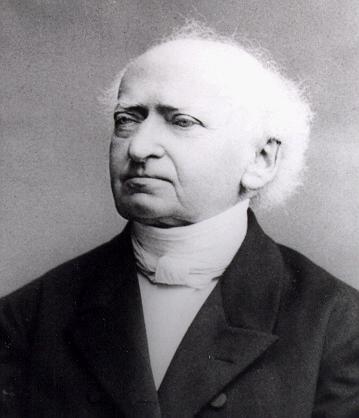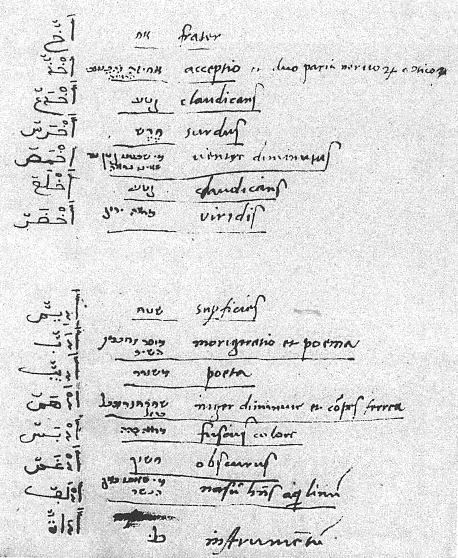|
Franz Delitzsch
Franz Delitzsch (23 February 1813, in Leipzig – 4 March 1890, in Leipzig) was a German Lutheran theologian and Hebraist. Delitzsch wrote many commentaries on books of the Bible, Jewish antiquities, Biblical psychology, as well as a history of Jewish poetry, and works of Christian apologetics. Today, Delitzsch is best known for his translation of the New Testament into Hebrew (1877), and his series of commentaries on the Old Testament published with Carl Friedrich Keil. Delitzsch's son, Friedrich Delitzsch (1850–1922), was an influential Assyriologist and author of works on Assyrian language, literature, and history. Biography Although Delitzsch was Christian, he was often supposed to be of Jewish ancestry, due to the unusual breadth of his rabbinical learning, as well as his strong sympathy with the Jewish people, whom he defended against attacks. His family circumstances were also unusual, in that he had a Jewish benefactor who lived in the family house, and a Jewish godfa ... [...More Info...] [...Related Items...] OR: [Wikipedia] [Google] [Baidu] |
Friedrich Delitzsch
Friedrich Delitzsch (; 3 September 1850 – 19 December 1922) was a German Assyriologist. He was the son of Lutheran theologian Franz Delitzsch (1813–1890). Born in Erlangen, he studied in Leipzig and Berlin, gaining his habilitation in 1874 as a lecturer of Semitic languages and Assyriology in Leipzig. In 1885 he became a full professor at Leipzig, afterwards serving as a professor at the Universities of Breslau (1893) and Berlin (1899). He was co-founder of the '' Deutsche Orient-Gesellschaft'' (German Oriental Society) and director of the '' Vorderasiatische Abteilung'' (Near Eastern Department) of the Royal Museums. Bible-Babel Controversy Friedrich Delitzsch specialized in the study of ancient Middle Eastern languages, and published numerous works on Assyrian language, history and culture. He is remembered today for his scholarly critique of the Old Testament. In a 1902 controversial lecture titled "Babel and Bible", Delitzsch maintained that many Old Testament writing ... [...More Info...] [...Related Items...] OR: [Wikipedia] [Google] [Baidu] |
Carl Friedrich Keil
Johann Friedrich Karl Keil or Carl Friedrich Keil (26 February 1807 – 5 May 1888) was a conservative German Lutheran Old Testament commentator. Keil was appointed to the theological faculty of Dorpat in Estonia where he taught Bible, New Testament exegesis, and Oriental languages. In 1859 he was called to serve the Lutheran church in Leipzig. In 1887 he moved to Rödletz, where he died. Keil was a conservative critic who reacted strongly against the scientific biblical criticism of his day. He strongly supported Mosaic authorship of the Pentateuch. He maintained the validity of the historico-critical investigation of the Bible only if it proved the existence of New Testament revelation in the Scriptures. To this aim he edited (with Franz Delitzsch) his principal work, a commentary on the Bible, Biblischer Kommentar über das Alte Testament (5 vols., 1866–82; Biblical Commentary on the Old Testament, 5 vols., 1872–77). The work remains his most enduring contribution t ... [...More Info...] [...Related Items...] OR: [Wikipedia] [Google] [Baidu] |
Christian Mission To Jews
Christian mission to Jews, evangelism among Jews, or proselytism to Jews, is a subset of Christian missionary activities which are engaged in for the specific purpose of converting Jews to Christianity. History Early Christianity The Gospels record that Jesus focused on preaching and teaching among the Jews in Judea and Galilee. Although he briefly visited Samaria to speak with Samaritans (John 4), he largely avoided ministering to Gentiles. In one encounter with a Gentile woman (Mt 15:23), he said, "I was sent only to the lost sheep of the house of Israel." Matthew and Acts record Jesus commissioning his followers to take his message beyond the confines of Judea after his resurrection (Mt 29:18-20; Acts 1:8). Although Christianity spread rapidly in Gentile regions as a result of this commissioning, Jesus's early Jewish followers did not neglect spreading his message among fellow Jews in Judea and the diaspora. The first recorded sermon by one of Jesus's apostles is by Peter, sp ... [...More Info...] [...Related Items...] OR: [Wikipedia] [Google] [Baidu] |
Institutum Judaicum
The Institutum Judaicum was a special academic course for Protestant theologians who desired to prepare themselves for missionary work among the Jews. The first of its kind was founded at the University of Halle, by Professor Callenberg in 1724. The great interest which Franz Delitzsch took in the conversion of the Jews to Christianity prompted him to establish a similar course at the University of Leipzig in 1886, and another was founded by Prof. Hermann L. Strack in Berlin the same year. The institutes of Leipzig and Berlin have courses in New Testament theology with reference to the Messianic passages in the Old Testament, and they also give instruction in rabbinic literature; they further publish works helpful to their cause, as biographies of famous converts, controversial pamphlets, autobiographies of converted Jews, and occasionally scientific tracts. The Berlin institute has published Strack's "Introduction to the Talmud," his editions of some tractates of the Mish ... [...More Info...] [...Related Items...] OR: [Wikipedia] [Google] [Baidu] |
Revival Of The Hebrew Language
The revival of the Hebrew language took place in Europe and Palestine toward the end of the 19th century and into the 20th century, through which the language's usage changed from the sacred language of Judaism to a spoken and written language used for daily life in Israel. The process began as Jews from diverse regions started arriving and establishing themselves alongside the pre-existing Jewish community in the region of Palestine in the first half of the twentieth century, when veteran Jews in Palestine (largely Arabic-speaking by that time) and the linguistically diverse newly arrived Jews all switched to use Hebrew as a lingua franca, the historical linguistic common denominator of all the Jewish groups. At the same time, a parallel development in Europe changed Hebrew from primarily a sacred liturgical language into a literary language, which played a key role in the development of nationalist educational programs. Modern Hebrew was one of three official languages of ... [...More Info...] [...Related Items...] OR: [Wikipedia] [Google] [Baidu] |
Gustaf Dalman
Gustaf Hermann Dalman (9 June 1855 – 19 August 1941) was a German Lutheran theologian and orientalist. He did extensive field work in Palestine before the First World War, collecting inscriptions, poetry, and proverbs. He also collected physical articles illustrative of the life of the indigenous farmers and herders of the country, including rock and plant samples, house and farm tools, small archaeological finds, and ceramics. He pioneered the study of biblical and early post-biblical Aramaic, publishing an authoritative grammar (1894) and dictionary (1901), as well as other works. His collection of 15,000 historic photographs and 5,000 books, including rare 16th century prints, and maps formed the basis of the Gustaf Dalman Institute at the Ernst Moritz Arndt University, Greifswald, which commemorates and continues his work. Dalman was appointed by Kaiser Wilhelm II as director of the ''Deutsches Evangelisches Institut für Altertumswissenschaft des heiligen Landes zu Jerus ... [...More Info...] [...Related Items...] OR: [Wikipedia] [Google] [Baidu] |
Proselytization
Proselytism () is the policy of attempting to convert people's religious or political beliefs. Proselytism is illegal in some countries. Some draw distinctions between '' evangelism'' or '' Da‘wah'' and proselytism regarding proselytism as involuntary or coerced but it can also be understood to merely be a synonym. Etymology The English-language word ''proselytize'' derives from the Greek language prefix (, "toward") and the verb (, "I come") in the form of (, "newcomer"). Historically, in the Koine Greek Septuagint and New Testament, the word '' proselyte'' denoted a Gentile who was considering conversion to Judaism. Although the word ''proselytism'' originally referred to converting to Judaism (and earlier related to Gentiles such as God-fearers), it now implies an attempt of any religion or religious individuals to convert people to their belief. Arthur J. Serratelli, the Catholic Bishop of Paterson, New Jersey, observed that the meaning of the word ''proselytis ... [...More Info...] [...Related Items...] OR: [Wikipedia] [Google] [Baidu] |
Arnold Ehrlich
Arnold Bogumil Ehrlich (15 January 1848 in Volodovka, Brest-Litovsk – November 1919 in New Rochelle, New York) was a scholar of bible and rabbinics whose work spanned the latter part of the 19th and the early 20th century. A formidable scholar, he is said to have possessed perfect recall, with an outstanding knowledge of Bible and Talmud, and to have spoken 39 languages. He is best known for his book ''Mikra Kiphshuto'' (''The Bible according to its Literal Meaning'') in three Hebrew volumes published from 1899–1901, in which he sought to bring the results of modern textual criticism of the Bible to a wider Hebrew audience, emphasising the Torah to be a document made by humans complete with scribal and copying errors, not a perfect work dictated to Moses at Sinai; and as a formative intellectual influence on the young Mordecai Kaplan. Ehrlich earned a living as a private tutor, and teaching at the Hebrew Preparatory School of the Temple Emanu-El Theological School ... [...More Info...] [...Related Items...] OR: [Wikipedia] [Google] [Baidu] |
Book Of Genesis
The Book of Genesis (from Greek ; Hebrew: בְּרֵאשִׁית ''Bəreʾšīt'', "In hebeginning") is the first book of the Hebrew Bible and the Christian Old Testament. Its Hebrew name is the same as its first word, ( "In the beginning"). Genesis is an account of the creation of the world, the early history of humanity, and of Israel's ancestors and the origins of the Jewish people. Tradition credits Moses as the author of Genesis, as well as the books of Exodus, Leviticus, Numbers and most of Deuteronomy; however, modern scholars, especially from the 19th century onward, place the books' authorship in the 6th and 5th centuries BC, hundreds of years after Moses is supposed to have lived.Davies (1998), p. 37 Based on scientific interpretation of archaeological, genetic, and linguistic evidence, most scholars consider Genesis to be primarily mythological rather than historical. It is divisible into two parts, the primeval history (chapters 1–11) and the anc ... [...More Info...] [...Related Items...] OR: [Wikipedia] [Google] [Baidu] |
Book Of Isaiah
The Book of Isaiah ( he, ספר ישעיהו, ) is the first of the Latter Prophets in the Hebrew Bible and the first of the Major Prophets in the Christian Old Testament. It is identified by a superscription as the words of the 8th-century BCE prophet Isaiah ben Amoz, but there is extensive evidence that much of it was composed during the Babylonian captivity and later. Johann Christoph Döderlein suggested in 1775 that the book contained the works of two prophets separated by more than a century, and Bernhard Duhm originated the view, held as a consensus through most of the 20th century, that the book comprises three separate collections of oracles: Proto-Isaiah ( chapters 1– 39), containing the words of the 8th-century BCE prophet Isaiah; Deutero-Isaiah ( chapters 40– 55), the work of an anonymous 6th-century BCE author writing during the Exile; and Trito-Isaiah ( chapters 56– 66), composed after the return from Exile. Isaiah 1– 33 promises judgment and restoration ... [...More Info...] [...Related Items...] OR: [Wikipedia] [Google] [Baidu] |





